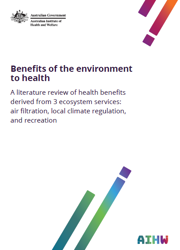Summary
The value of the environment – to the economy and to human wellbeing – can be estimated through ecosystems accounts. Accounts on ecosystem assets and the services they provide can be compiled using the System of Environmental Economic Accounting Ecosystem Accounting (SEEA EA) framework adopted by the United Nations Statistical Commission in March 2021 (SEEA 2022).
In Australia, the Department of Climate Change, Energy, the Environment and Water (DCCEEW, formerly the Department of Agriculture, Water and the Environment – DAWE) is developing environmental ecosystem accounts. To do this, it is seeking to gain a wide understanding of the extent of the economic and social benefits of ecosystem services. It was in this context that the former DAWE commissioned the Australian Institute of Health and Welfare (AIHW) to conduct an extensive review of the evidence on ecosystem services and their benefits to, and impacts on, human health.
This review analyses a broad range of current relevant literature on the benefits of the following 3 ecosystem services for human health:
- air filtration – the filtering of air-borne pollutants by ecosystems, in particular by plants,
- to mitigate harmful effects of pollution
- local climate regulation – the regulation of ambient temperatures by plants and water bodies to improve local living conditions
- recreation-related services – the qualities of ecosystems that allow people to use and enjoy the environment, such as through providing opportunities for physical activity or other passive recreational pursuits.
An extensive review of available Australian and international literature found associations between ecosystem services and a range of health outcomes, although the evidence more strongly supported this relationship for some health outcomes than others. The review also sought to uncover existing research of health benefits of these ecosystem services in economic terms, in particular those using methods consistent with the SEEA EA framework.
The AIHW review revealed multiple examples of evidence in support of a wide range of health benefits associated with each of the 3 ecosystem services. Key health benefits included:
- air filtration is associated with improved respiratory outcomes (such as for asthma) and decreases in mortality. Positive maternal and perinatal outcomes are areas being increasingly researched
- local climate regulation is associated with decreases in both all-cause mortality, and in hospitalisations due to heat
- recreation-related services are associated with increases in both physical activity, and in subjective mental wellbeing associated with recreation in nature.
A range of other health benefits associated with these ecosystem services were also revealed, such as for cardiovascular health, heat-related mortality, obesity, diabetes, and immune function. However, the evidence for these tended to be inconsistent: some studies supported a positive association between the ecosystem service and the health benefit, while others found no association, or insufficient evidence to support one. In many cases, the equivocal findings could be attributed to design limitations in the original research articles. Inconclusive evidence does not necessarily mean an association does not exist – rather that the research approach may not have been the most appropriate for the research question.
Summary
1. Introduction
- Purpose of the review
- What is ecosystem services accounting?
- What are ecosystem services?
- The 3 domains of ecosystem services
- Selection of ecosystem services for review
- Human health, health determinants and the environment
- Methodology
2. Ecosystem services and health – background and terminology
- What is nature?
- Green space
- Blue space
- Health and wellbeing
- What evidence connects nature to health and wellbeing?
- All-cause mortality
- Cardiovascular health
- Type 2 diabetes
- Overweight and obesity
- Mental health
- Stress
- Insufficient physical activity (as a health risk factor)
- Immune function
3. Air filtration services
- What is air pollution?
- How does air pollution affect human health?
- Disease burden and expenditure due to air pollution in Australia
- What is air filtration?
- Overview of the literature
- Mortality
- Respiratory health
- Cardiovascular health
- Blood pressure
- Maternal and (non-respiratory) childhood outcomes
- Air filtration and mental health
- Economic impact and health
- Grey literature
- International case study 1
- International case study 2
- Gaps and limitations
- Australian-specific studies
- Contribution of blue spaces to air filtration
- Air filtration and mental health
4. Local climate regulation
- What is local climate?
- Green space, blue space and local climate
- What is the urban heat island effect?
- Non-optimal temperature and human health
- What is the cost of heat mortality?
- What is ‘local-climate regulation’?
- Overview of the literature
- All-cause mortality
- Heat-related mortality
- Cardiovascular health
- Combined cardiorespiratory health
- Diabetes
- General and mental health
- Morbidity indicators
- Economic impact and health
- Avoided costs
- Avoided deaths and morbidities
- Grey literature
- International case study
- Australian case study
- Gaps and limitations
- Study comparability
5. Recreation-related ecosystem services
- What are recreation-related ecosystem services?
- Overview of the literature
- Physical health effects
- General health
- Life expectancy and mortality
- Blood pressure
- Physical activity
- Obesity
- Mental and psychological health effects
- General mental health
- Depression
- Other potential health benefits
- Blue spaces and health
- Recreation-related ecosystem services, health and the COVID-19 pandemic
- Economic impact and health
- Grey literature
- International case study
- Gaps and limitations
- Recreation-related ecosystem services terminology
- Social health
- Diabetes
6. Discussion
- Limitations and considerations
- Future steps
Appendix A: Ecosystem services
Appendix B: Summary of eligible articles, by ecosystem service
Appendix C
Appendix D
End Matter: Acknowledgements; Abbreviations; Symbols; Glossary; References; List of figures; List of tables; List of boxes; Related publications.



